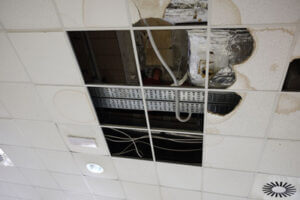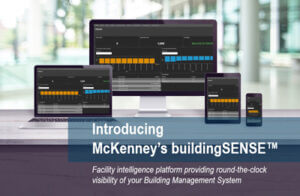Site Monitoring solutions enhance the performance of a building’s various systems to ensure the building is safe, comfortable, secure, and energy efficient. Intelligent data-enabled automation and controls means that HVAC, lighting, security, and surveillance can be integrated on a single platform to enable facilities managers to make informed decisions.
Energy Assessments Point the Way Toward Operational Improvement
Energy usage can account for one-third of a commercial building’s operating costs. Integrating energy efficient strategies can lead to reduced energy use and operational improvements and savings. Regular performance reviews and … Read More
The Cost of Building Neglect
Commercial building maintenance is an ongoing task. It may seem like a chore, but problems don’t usually go away on their own. In fact, they may only worsen over time. Regular building maintenance and inspections enhance the performance of the systems, minimize downtime, and reduce costs.
Introducing McKenney’s buildingSENSE
Information is great. Knowledge is even better. Every facility has an abundance of information that can be gathered, analyzed, and leveraged for more energy-efficient operations. But you need to know where to look for it and—more importantly—what to do with it.
5 Reasons Now is the Wrong Time to Invest in AR
Beneficial uses for augmented reality (AR) in commercial and industrial settings are growing. AR hardware manufacturers and software developers continue to identify new applications for these tools. As the tools improve, business leaders must evaluate whether right now is the time to invest. I believe that it is not the right time to invest in AR… yet.
Five Common Commercial Plumbing Problems
In contrast to residential systems, commercial plumbing systems are under much more pressure and are often subject to heavy use, making them more prone to break down. If dealt with quickly, minor issues are likely to be easy to resolve. If plumbing repairs are postponed, the resulting damage will likely lead to costly expenditures down the road.
Requirements for LEED Zero Certification
Launched in 2018, the LEED Zero certification is a relatively new designation in the building industry. To understand its meaning and implications, we should first examine the original LEED certification program. LEED certification has been a standard in the building industry since the 1990s. Environmentally conscious companies, architects and builders have sought to reduce the environmental impact of their facilities by building green. The U.S. Green Building Council (USGBC) is an independent non-profit organization that maintains a rating system called LEED (Leadership in Energy and Environmental Design). LEED is recognized worldwide as a symbol of sustainability achievement.
PLC vs. DDC: Choosing the Right Controls for Your Facility
Most buildings’ control systems utilize Direct Digital Control (DDC) technology to manage the output and actions of HVAC systems, especially in the commercial market. However, for the industrial market and other mission-critical facilities, Programmable Logic Controllers (PLC) are often a better, faster and more reliable option that should be considered.
How Updated CDC Guidance on COVID Transmission Impacts HVAC Systems
With COVID-19 impacting our daily lives for almost a year at this point, wearing a mask and spacing out in the cashier lines has become a familiar feeling for us. As the scientific community has published more information about this virus and how it spreads, we can more intelligently discuss the usage of HVAC to mitigate spread in buildings that are reopening.














